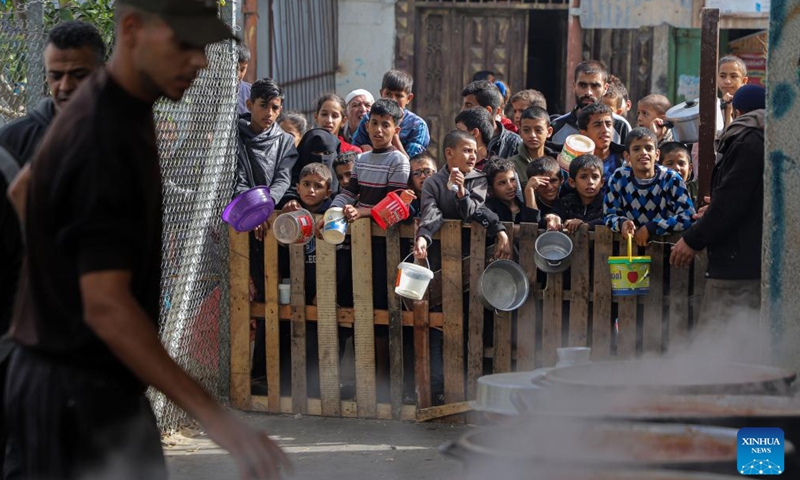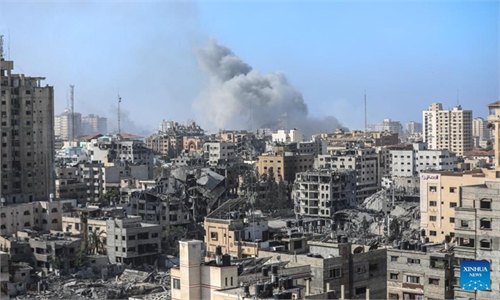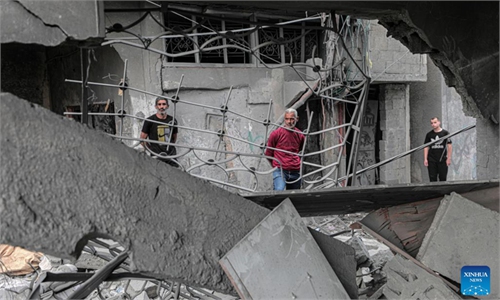Truce in Gaza ‘a key window for humanitarian assistance’
Pause will ‘save limited lives if cease-fire can’t be maintained’

People wait for food relief in the southern Gaza Strip city of Rafah, Nov. 19, 2023. (Photo: Xinhua)
Israel and Palestinian armed group Hamas have very limited mutual trust to execute the temporary cease-fire and a hostage release deal, so they need more time to solve technical problems, said experts on Thursday, as the Israeli side claimed that the truce will be delayed and no hostages will be released before Friday.
Meanwhile, analysts stressed that a four-day pause can only save limited lives if the conflict ever resumes, and the international community needs to make efforts to turn the pause into a sustainable truce.
The four-day pause agreed by the conflicting parties on Wednesday has been seen as a diplomatic breakthrough that will free dozens of hostages held by militants as well as Palestinians imprisoned in Israel, and bring a large influx of aid into the besieged Palestinian territory. The breakthrough comes after the UN Security Council on November 15 adopted a resolution calling for urgent and extended humanitarian pauses and corridors in Gaza.
China, as the rotating president of the UN Security Council for November, has worked with the international community to finally realize a temporary cease-fire for the people who suffered as a result of the conflict in Gaza, but to what extent this breakthrough can be turned into greater progress that can effectively save more lives and prevent more deaths remains in question, unless the international community makes further efforts to make it a sustainable long-term cease-fire, said experts.
Hard-won but fragile pause
With this current round of the Palestine-Israel conflict entering its seventh week, the war has leveled vast swaths of Gaza, fueled a surge of violence in the occupied West Bank, and stirred fears of a wider conflagration across the Middle East.
But Israeli Prime Minister Benjamin Netanyahu told a nationally televised news conference that the war would resume after the truce expires. Israel's goals are to "destroy Hamas' military capabilities and return all 240 hostages held captive in Gaza."
The cease-fire efforts hit another hurdle when Israel's national security adviser said in a late-night announcement that the deal would not take effect before Friday, one day later than originally expected. Tzachi Hanegbi gave no reason for the delay, but media said there were still some last-minute details being ironed out.
Wang Jin, an associate professor at the Institute of Middle Eastern Studies of Northwest University, told the Global Times on Thursday that the reason could be technical. "The temporary cease-fire and release of hostages will take place, but the two sides need some more time to deal with problems like who should be released, when, where and how to release them, as well as paperwork."
"The process of a hostage or prisoner exchange will be difficult due to the lack of mutual trust between Israel and Hamas, but the exchange will take place as both sides want it to happen. The Netanyahu administration faces huge domestic pressure on the hostage problem, while Hamas also wants to buy itself more time in this brutal conflict," Liu Zhongmin, a professor at the Middle East Studies Institute of Shanghai International Studies University, told the Global Times on Thursday.
Medhat Abbas, director of the Health Ministry in Hamas-ruled Gaza, says it has resumed its detailed count of casualties from the ongoing war with Isreal, and has documented more than 13,000 deaths. Abbas confirmed the resumption to The Associated Press on Thursday.
"The four-day pause will enable the international community to provide more materials to the region and ease the pressure on local hospitals, but after the pause, the war will restart and people will keep dying, so how to save more lives is a challenge as the Israeli side refuses to completely stop the fighting at this moment, and as soon as Israeli forces resume bombardments and assaults, more people will get killed for sure," Liu noted.
During the pause, it will be crucial for the international community, which supports making further efforts toward peace, to use it as a key window to maximize the possibility of a longer cease-fire, for instance, by encouraging both sides to release more hostages so that the humanitarian crisis can be stopped effectively, said some observers.
China stands for justice
The current hopes for peace come after the UN Security Council adopted Resolution 2712 on November 15, which lay the foundation for Israel and Hamas to reach a deal for exchanging hostages and prisoners and observing a four-day cease-fire. Experts said that, this time, the resolution was not vetoed by any permanent member of the UN Security Council, and this is clearly a result of coordination between major powers. On the same day, the heads of state of China and the US met in San Francisco.
The resolution calls for urgent and extended humanitarian pauses and corridors throughout the Gaza Strip "for a sufficient number of days" to enable full, rapid, safe, and unhindered humanitarian access; to facilitate the continuous, sufficient and unhindered provision of essential goods and services throughout Gaza, including water, electricity, fuel, food, and medical supplies, as well as emergency repairs to essential infrastructure; and to enable urgent rescue and recovery efforts, including for missing children in damaged and destroyed buildings, and including the medical evacuation of sick or injured children and their caregivers.
Some US media outlets such as the Wall Street Journal recently claimed that "China is trying to take the moral high ground or challenge the US in the Middle East by taking more assertive actions to support Palestine," a charge that has been refuted by Chinese experts. They contend that China's role in the Palestine-Israel issue is entirely different from that of the US, as China has never been driven by selfish geopolitical interests, always stands with justice and takes a non-biased, neutral and fair position.
This is the reason why all regional countries, especially the Arab and Islamic nations, trust and welcome China to play a more constructive role, Liu said.
On Monday, a delegation formed by foreign ministers of a group of Arab and Islamic countries, including Saudi Arabia, Egypt, Jordan, Indonesia and Palestine, as well as the secretary general of the Organization of Islamic Cooperation, visited Beijing. Choosing China as the first destination of their trip to the five permanent members of the UN Security Council proves that China is trusted by the regional countries, and China's influence and credibility are well recognized and well respected, experts said.
The US, as well as some Western media, need to realize that it was the failed, selfish, messy and inconsistent Middle East policies of Washington that have caused endless tragedies in the region, while China and other members of the international community are being responsible in dealing with these problems, which were actually created by the West, and the US should not be jealous when China's contribution is applauded globally, said experts.



